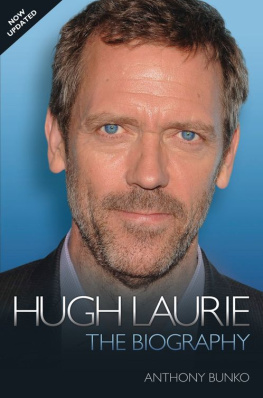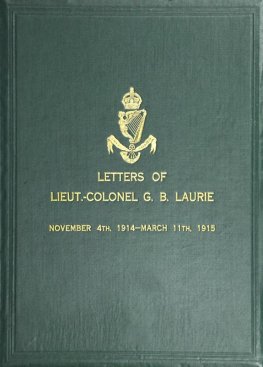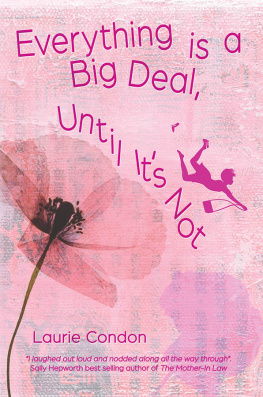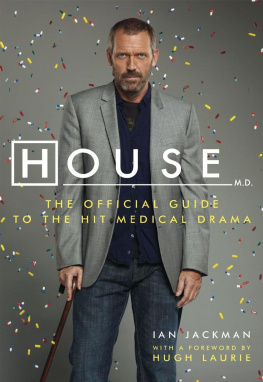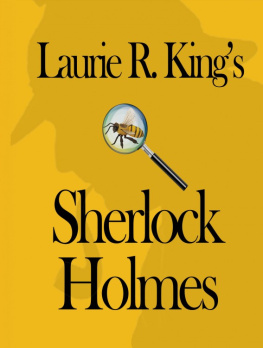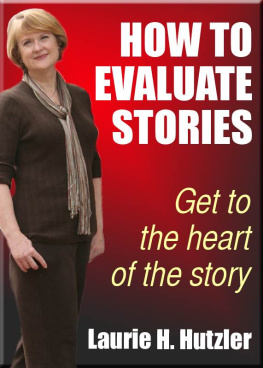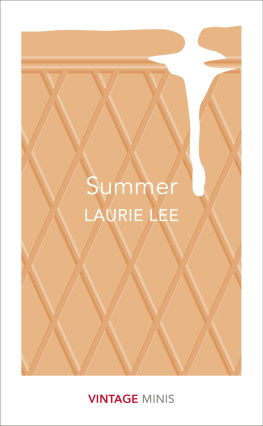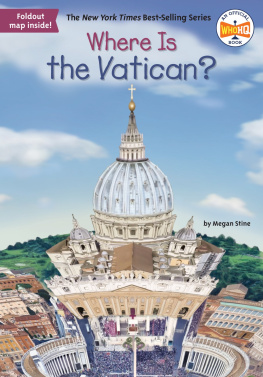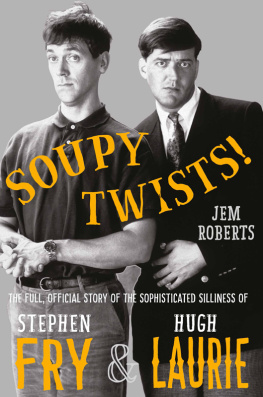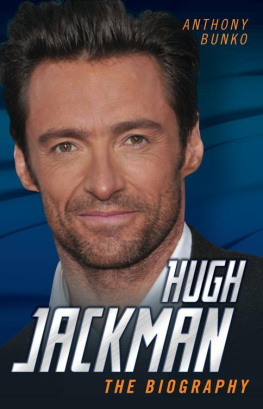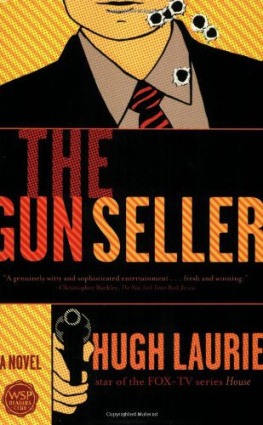Bunko - Hugh Laurie
Here you can read online Bunko - Hugh Laurie full text of the book (entire story) in english for free. Download pdf and epub, get meaning, cover and reviews about this ebook. year: 2011, publisher: John Blake Publishing, genre: Detective and thriller. Description of the work, (preface) as well as reviews are available. Best literature library LitArk.com created for fans of good reading and offers a wide selection of genres:
Romance novel
Science fiction
Adventure
Detective
Science
History
Home and family
Prose
Art
Politics
Computer
Non-fiction
Religion
Business
Children
Humor
Choose a favorite category and find really read worthwhile books. Enjoy immersion in the world of imagination, feel the emotions of the characters or learn something new for yourself, make an fascinating discovery.
- Book:Hugh Laurie
- Author:
- Publisher:John Blake Publishing
- Genre:
- Year:2011
- Rating:4 / 5
- Favourites:Add to favourites
- Your mark:
- 80
- 1
- 2
- 3
- 4
- 5
Hugh Laurie: summary, description and annotation
We offer to read an annotation, description, summary or preface (depends on what the author of the book "Hugh Laurie" wrote himself). If you haven't found the necessary information about the book — write in the comments, we will try to find it.
Hugh Laurie — read online for free the complete book (whole text) full work
Below is the text of the book, divided by pages. System saving the place of the last page read, allows you to conveniently read the book "Hugh Laurie" online for free, without having to search again every time where you left off. Put a bookmark, and you can go to the page where you finished reading at any time.
Font size:
Interval:
Bookmark:
To the Trinity Tiddlers, who leap-frogged their way into our hearts.
H ugh Laurie looked tired, more tired than usual as he shuffled in his seat. Outside, the sun had already descended, but it was still stifling hot as the late African evening closed in. The English actor had just returned to his hotel room after a full days shooting of the remake of the 1965 movie Flight of the Phoenix and he was exhausted. He hadnt even had time for a change of clothing.
Along with the rest of the cast and crew, Hugh had been filming in the Namib Desert for nearly four months and it was starting to take its toll on all of them. It had been a tough shoot so far, especially for the crew because everything, including camera equipment and the giant set of lights, disappeared in the shifting sands most nights.
Every camera setup was brutal for them in the heat, Hugh later said. Im still pulling sand out of my trouser cuffs and parts of my body that I will never get rid of. I still get a little nervous when I see an egg timer. But, to be honest, we were never further than one hour away from a cold beer.
It was just before Christmas, 2003. Hugh sat in his dusty, dirty clothes with his three-day-old stubble in the bathroom of the Swakopmund Hotel in Namibia in southwest Africa, possibly not the best place or the best look for what turned out to be the most important audition of the 37-year-olds life. Or maybe it was just what was required? Perhaps it was all part of the masterplan.
It was the time of the year known in the acting profession as the pilot season, when actors the world over receive scripts of possible new pilot shows from their agents. Hugh said, At that time quite a few actors on the film were being sent things and were making tapes and sending them in because they wanted to keep themselves in the swim. So it was almost a daily occurrence that someone would say, Oh, I just got a script, what do you think of it?
Tonight it was Hughs turn to face the hand-held camera.
To be truthful, the actor who had made his name playing half-witted, goofy middle-class English characters for most of his career had been so worried about finding scorpions in his shoes every morning that hed almost forgotten about the pilot script hed received.
Jacob Vargas, Hughs co-star from the movie, held a small camera in his hand. Unfortunately the shaving mirror in the hotel bathroom was the best light they could find. They were in a poor part of the world and basic facilities like electricity werent exactly plentiful.
Behind Jacob, out of shot, another actor from the Phoenix film, Scott Michael Campbell, not only offered moral support but also volunteered to co-read with Laurie.
In his hands Hugh held three pages of the script that had been faxed to him on the only fax machine in a hundred-mile radius. He wasnt quite sure about the storyline or the role he was auditioning for in the pilot of yet another new American drama; a pilot show which hadnt even been named up to this point. At the time I was thinking, Its a pilot, thats all. Maybe 10 or 12 days work, he said. I didnt assume it would go any further than that. Most times they dont.
Yet Laurie could tell from just a quick read of the dialogue that it was different; it was good material and the character sounded very interesting.
Although an interesting character, Hugh didnt think for one minute that the role he was auditioning for was actually going to be the central figure of the proposed show. Its tradition on American television that the central figure is usually the morally good person, which in Hollywood also often means being good-looking with a 44-inch chest and a chiselled jawline to die for.
The scenes I got described House and Wilson and I actually read for both, explained Hugh. But I thought that Wilson was the main character. He was the sort of clean-cut hero who would save lives and do battle with evil and fight crime generally, and I would be the sort of irritable but soft-hearted sidekick.
He admitted that it wasnt until he got the entire script a while later that he realised House was the main character. It wasnt called House. It didnt have a title then. So that was the biggest surprise, to discover they were going to make the whole show about this character and they were going to call it House. And they were making a show about such an apparently unlikeable and complicated guy. Usually on American TV the hero is very handsome and very good and theyre saints, theyre saintly figures. And this was an unusual thing, to have such a horrible man in the middle of the show. But I loved him right from the start, I just loved the character. He made me laugh and I just fell for him. I just liked him right at the beginning.
Nevertheless, hero or not, main character or just a walk-on part, like most things Hugh has done during his career, he was determined to give it his best shot. I didnt want to fail again at an audition I knew I could have done well. Like every other actor Ive done hundreds of auditions but nothing ever happens. So this time I decided that I was not going to leave the room smacking my forehead and going, Dammit, if only Id done this. I was sick of my own feebleness in the face of stress. So I worked hard at it and I did get it right. He even improvised, using an old battered umbrella to lean on instead of a cane.
It wasnt the dialogue that worried him. It was like a piece of music. I felt like I knew how it should sound. It didnt have anything to do with medical accuracy or behavioural accuracy. These pages to me seemed like pieces of music and I just knew how they should be played, he revealed.
What did play on his mind was the fact that he was required to play the role with an American accent. Although he had some experience from past performances to draw on, such as his role in the Stuart Little films, and of course various comedy sketches, he didnt want it to sound too fake.
I could hear the character in my head, said Hugh. The rhythm of his speech. What he was hiding behind the meanness and sarcasm. I could see him very clearly in my head from the start.
Hugh took a deep breath and talked at the camera. I apologise for my appearance but he paused things havent been going too well lately. A longer pause followed. He glanced at the floor for a few seconds and then, as if by magic, he seemed to transform into a different person or maybe he was just being himself. It all seemed so natural. Gone were the comical facial expressions that fans of shows like Blackadder were used to. This was serious stuff. For the next few minutes it actually looked like he wasnt acting at all. In fact it was so convincing and effortless, he appeared to be just having an everyday conversation with someone else in the room, albeit in a fake New Jersey accent.
The drawl was just perfect Laurie later credited this to a misspent youth watching too much TV and too many movies.
So, with the audition recorded and the actor pleased with what he had done, the tape was shipped off and Hugh went for a hot bath and a long cold beer, not necessarily in that order.
He knew the odds of getting the role were heavily stacked against him. Firstly, being in Namibia at the time of the casting sessions wouldnt help his cause. Secondly, hed heard a rumour that the producers were adamant about casting a quintessentially American person to play the role of House; executive producer Bryan Singer (director of X-Men and Batman Returns) in particular felt there was no way he was going to hire a non-American actor for the role.
And lastly, it seemed that Lauries age might go against him, as the pilot script called for House to be 34; although director David Shore revealed much later that he never wanted House to be that young or too good looking. If Brad Pitt had played the part, you would have gone, Oh, shut up! Shore said.
Font size:
Interval:
Bookmark:
Similar books «Hugh Laurie»
Look at similar books to Hugh Laurie. We have selected literature similar in name and meaning in the hope of providing readers with more options to find new, interesting, not yet read works.
Discussion, reviews of the book Hugh Laurie and just readers' own opinions. Leave your comments, write what you think about the work, its meaning or the main characters. Specify what exactly you liked and what you didn't like, and why you think so.

